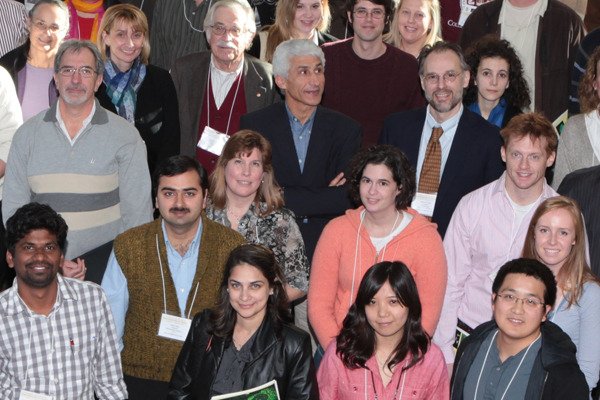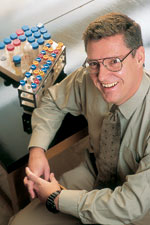
|
TOP STORIES |
|
For more about faculty research and other items, see Faculty News.
BILLION-DOLLAR IMPACT It is gratifying to hear so many people declare the College of Medicine an unqualified success. But beyond anecdotal evidence, exactly what impact has the College of Medicine had on the communities it serves across the state?
Besides a mountain of charts, graphs and meaningful numbers, the report includes dozens of comments from interviews with students, faculty members, community board members and others. This is a sampling:
You can read the entire study on the College of Medicine website, or a condensed version there if you prefer. If you're new to the Florida State approach and want to learn more about it, please visit the website and look for the heading "Our Innovative Model." If you would like a hard copy of the socioeconomic impact study, call the Department of Public Affairs, Communications and Alumni Affairs at (850) 645-9698.
THE INNOVATORS Research at the College of Medicine is leading to important discoveries and potential new ways of approaching the fight against disease and injury. In November, the Office of Research honored five College of Medicine faculty members and staff during the Sixth Annual Florida State University Innovators Appreciation Ceremony. They were recognized, along with other university researchers, for their roles in inventions, patents and entrepreneurship.
Professor
Michael Blaber, Associate Professors Branko Stefanovic, James
Olcese and Xian-Min Yu and postdoctoral staff member
Kate Calvin were recognized with the 2010 Innovator Award for varying
degrees of progress in the patent application process. Blaber received three
U.S. patents in 2010 for his work with mutant forms of human proteins that
have been shown to help the human body grow new blood vessels to restore
blood flow in damaged areas of the heart. Calvin and Yu both filed
application submissions in 2010. Blaber, Olcese and Stefanovic all submitted
disclosures. "Research in any field has the potential for useful intellectual property, but the traditional responsibilities of faculty do not historically include training or preparation in thinking along such lines," Blaber said. "Not all intellectual property will ultimately prove useful, of course, but intellectual property that does can have a major impact upon improving people's lives, as well as the economic health of the university and local community."
'FROM MOLECULES TO MEDICINE' The inaugural Florida State University Life Sciences Symposium, which took place in January at the College of Medicine, took an unorthodox approach -- and was a major success, bringing together more than 185 life scientists from across the university and beyond. Planning is already under way for next year's session.
Titled "From Molecules to Medicine," it was sponsored by the Department of Biomedical Sciences, with support from the Office of Research; the Department of Chemistry & Biochemistry; the Department of Biological Science; Nikon; and Olympus.
"The 17 talks and 53 posters were exciting and stimulating," said Richard Nowakowski, Ph.D., chair of Biomedical Sciences, "and even more stimulating were the hallway, coffee break and lunch conversations."
"As time goes on, research in biomedical sciences is being pursued in more and more different departments at FSU, and includes such diverse departments as physics, mathematics, engineering, molecular biophysics and chemistry, in addition to the more traditional departments such as psychology, biology and, of course, the College of Medicine. The researchers within these diverse departments apply widely different tools in solving the biomedical problems they are studying; they naturally also have a different viewpoint. The intent of the symposium was to bring these diverse researchers together in order to understand and benefit from each other's insights.
The typical symposium, he said, focuses on a narrow subject or area of
excellence, and each talk is related to that subject. But not this time.
"We took a different approach,"
Blaber said, "casting a
wide intellectual net, if you will. The result was that the symposium was an
eclectic mix of biomedical research, and included talks that covered the
spectrum from 'molecules
to medicine.'"
HOSTING A MAJOR EVENT IN EVOLUTIONARY MEDICINE Some of the biggest names in evolutionary medicine will be in Tallahassee Feb. 25-26 for an international conference at Florida State University. The keynote speakers for "Evolutionary Medicine: Contributions to the Study of Disease and Immunity" will be Dr. Randolph Nesse of the University of Michigan and Sir Peter Gluckman of the University of Auckland (New Zealand). The lineup also includes Paul Ewald, director of the Evolutionary Medicine Program at the University of Louisville; Kathleen Barnes, of the Johns Hopkins Center for Global Health; and Michael Ruse, Lucyle T. Werkmeister Professor of Philosophy at FSU.
Evolutionary medicine is the application of evolutionary theory to the understanding and treatment of disease. Nesse, one of the founders of the field, described it this way: "We're trying to understand why natural selection has not made the body better, why natural selection has left the body with vulnerabilities. For every single disease, there is an answer to that question. And for very few of them is the answer very clear yet." Nesse is Professor of Psychiatry and Psychology and director of the Evolution and Human Adaptation Program at the University of Michigan, Ann Arbor. He is the author of numerous publications, including "Why We Get Sick" (1995).
Gluckman is a University of Auckland Distinguished Professor and one of New Zealand's most highly decorated medical scientists. In 2001 he was awarded New Zealand's highest scientific award, the Rutherford Medal. He served as the first Chief Science Advisor to the Prime Minister of New Zealand and is the founding director of the Liggins Institute, home of the Centre for Human Evolution, Adaptation and Disease. Gluckman is also the author of more than 500 scientific articles and is co-author of "Principles of Evolutionary Medicine," the first textbook on the topic.
The conference is jointly sponsored by the FSU College of Medicine, the Department of Biology, and the History and Philosophy of Science Program. Conference events will take place at the medical school's Thrasher Building and the King Life Sciences Building. Two endowments supporting the conference are the Frank and Yolande Fowler Endowment in Modern Molecular Biology and the William H. and Lucyle T. Werkmeister Endowment Fund.
Registration for the conference is free and open to the public.
FOR CAREGIVERS AND MEDICAL PROFESSIONALS One of the world's leading authorities on Alzheimer's disease will be the keynote speaker Feb. 19 at Tallahassee's 26th Annual Alzheimer's Education and Training Conference. The conference, scheduled for 8 a.m.-3 p.m. at the College of Medicine, offers both professional and caregiver tracks. It is open to the public and free, except for those seeking CME/CEU credits.
Peter Whitehouse, author of "The Myth of Alzheimer's: What You Aren't Being Told About Today's Most Dreaded Diagnosis" (2008), is the keynote speaker. Whitehouse, a physician with a Ph.D. in psychology, trained at Brown and Johns Hopkins universities and is the founder of the University Alzheimer Center (now the University Memory and Aging Center) at Case Western Reserve University and University Hospitals Case Medical Center.
The conference's primary sponsor is the Alzheimer's Project. Alice Pomidor, Alzheimer's Project board member, said one of the event's strengths is that it offers something for both caregivers and medical professionals.
"Caregivers can bring their questions and learn about all kinds of subjects, from behavior management to medications to the latest research," said Pomidor, associate professor in the Department of Geriatrics. "There's really nothing else like it in the area that gives caregivers such a wonderful opportunity to learn from professionals, find out about support services, and get some help. For professionals, this conference provides practical tips for clinical care as well as evidence-based medical updates about the management of patients with dementia. There are also many professionals who are involved with a family member or friend suffering from dementia who may need both the professional and caregiver support."
Registration is free to the general public; CME/CEUs, $25 for 4 credit hours. Contact James Smith, MSW, Alzheimer's Project, (850) 386-2778. Deadline: Feb. 17.
'NEVER TOO LATE' HEALTH FAIR COMING UP Here is one more large-scale event scheduled for the College of Medicine in February: the "It's Never Too Late to Learn" Sexuality and Aging Health Fair. The event is aimed at people 65 and older.
Among the activities will be free health screenings. Many groups are taking part in the health fair, including the Tallahassee Senior Center, the Area Agency on Aging for North Florida, and four student organizations from the College of Medicine: the Family Medicine Interest Group, American Medical Student Association, Geriatric Interest Group and Student National Medical Association.
The event is scheduled from 10 a.m. to 1 p.m. Friday, Feb. 11, and is free and open to the public. But anyone planning to participate must RSVP. For more details, check this calendar listing. To RSVP, contact Ceola Grant, 850-645-1512.
JUMP-STARTING COMMUNITY RESEARCH The Florida State University College of Medicine and the University of Florida have jointly received $600,000 from the State University System of Florida Board of Governors to strengthen research, education and service efforts in areas of public health and to boost economic growth.
The award, under the New Florida 2010 Scholar's Clustering Grant Program, aims to foster collaborations among state institutions in the areas of health, science and engineering. It is part of a broader program to engage the State University System in the creation of high-skill, high-wage, knowledge-based employment opportunities.
The funds will support the UF-FSU Community Research Collaborative Program, a research effort that combines Florida State's strength in community-based medical education with UF's expertise in clinical and translational science research. (Read the entire press release.)
A FULBRIGHT FIRST
Nadira Muratova,
a physician and health
researcher from Uzbekistan who will be in Florida
Her mentor at the College of Medicine, Center on Patient Safety Director Dennis Tsilimingras, M.D., MPH (pictured above), said: "My hope is that when she returns to Uzbekistan, she will become the mother of patient safety."
BREASTFEEDING BOOST
"For nearly all infants, breastfeeding is the best source of infant nutrition and immunologic protection, and it provides remarkable health benefits to mothers as well. Babies who are breastfed are less likely to become overweight and obese. Many mothers in the United States want to breastfeed, and most try. And yet within only three months after giving birth, more than two-thirds of breastfeeding mothers have already begun using formula.... I have issued this Call to Action because the time has come to set forth the important roles and responsibilities of clinicians, employers, communities, researchers, and government leaders and to urge us all to take on a commitment to enable mothers to meet their personal goals for breastfeeding."
RESEARCH FAIR The atrium will be filled with posters and easels again Feb. 8 for the College of Medicine's annual Research Fair. Dozens of medical students, graduate students and faculty members will display their posters, and from noon to 1:30 p.m. they will be in the atrium to answer questions about their work.
|
 |
 |
 |
| E-mail Alumni Affairs Phone: 850-645-9428 | ||
|
|
|
Florida State University
|
College of Medicine
|
Copyright 2013
|

 Nowakowski praised the work of Biomedical Sciences Professor Michael
Blaber, Ph.D., who chaired the organizing committee. Blaber (pictured
below) explained the thinking behind the symposium:
Nowakowski praised the work of Biomedical Sciences Professor Michael
Blaber, Ph.D., who chaired the organizing committee. Blaber (pictured
below) explained the thinking behind the symposium: Joan Meek
Joan Meek